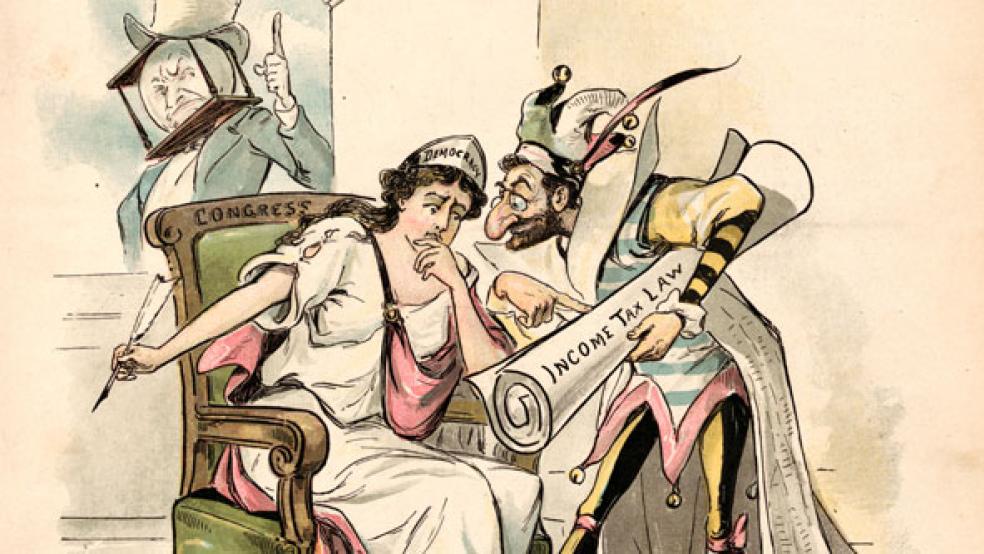The big-government movement has taken a few body blows over the last couple of months, especially at the IRS.

The agency has become the nexus of this ideology, thanks to its traditional role as revenue collector, and its new role as health-insurance authority in the Affordable Care Act (ACA), better known as Obamacare. The IRS has never been popular with Americans. Tax collectors have been unpopular since the time of Jesus, after all, and their public relations haven’t improved much in the succeeding two millennia.
Lately, though, the reputation of America’s tax collectors has hit bottom. It started with a ham-handed attempt to defuse the results of an Inspector General audit that showed the tax-exempt unit had singled out conservative groups for heightened scrutiny, and arguably harassment.
Dozens of progressive groups received approval for tax-exempt status over a 27-month period while no conservative groups that mentioned the Tea Party or constitutional government cleared the approval process. The politically-targeted audits included the National Organization for Marriage, which had its confidential financial information from its application to the IRS leaked to its political opponents and to the media.
RELATED: OBAMA LOSES INDEPENDENTS OVER GOVERNMENT SCANDALS
Where was IRS management while all this took place? Initially, they blamed this on low-level employees in one office, but whistleblowers surfaced to testify that they got orders for this scrutiny from IRS headquarters in Washington DC. The official who offered an apology as a way to get ahead of the story, Lois Lerner, ended up taking the Fifth Amendment when the House Oversight Committee demanded her testimony as to what happened on her watch. President Obama asked for the resignation of the acting IRS commissioner only to appoint a political ally to take charge, Danny Werfel, who soon declared that he found no malice in the IRS targeting of conservatives.
That had veteran reporter Ron Fournier at National Journal rolling his eyes. “Don’t buy it,” Fournier advised readers, saying the conclusions trumpeted by both parties on this IRS targeting scandal are “based on incomplete evidence and no credible investigation.”
That’s bad enough for an agency that serves as the enabler and nexus for big government, but it’s not the only area that requires investigating. Another IG audit shows that the IRS spent millions of dollars on booze, baby clothes, porn, and $100-a-head meals. J. Russell George, the same Treasury IG that uncovered the targeting of conservatives, detailed the abuse of agency credit cards and expense accounts in his latest report on misuse of public resources.
To some extent, this kind of abuse happens in the private sector with corporate credit cards, too. That’s why owners and shareholders insist on constant auditing of accounts and consequences for employees who either act irresponsibly or abuse their privileges. At the IRS, however, the agency doesn’t even have a mechanism to cancel cards held by exiting employees, let alone check to make sure that current employees don’t use the cards for personal purchases.
An earlier report says the IRS spent more than $50 million on more than 200 employee conferences between 2010 and 2012, including one 2012 meeting in Anaheim, CA, that cost taxpayers $4 million. The Associated Press reported that many attendees were given perks including baseball tickets and hotel suites on the taxpayers’ dime.
The IRS, George noted on that occasion, didn’t even have a mechanism to enforce prompt payment of travel bills or to punish those who paid late. Is that the experience that taxpayers have when dealing with the IRS? I daresay that anyone who fails to pay taxes on time or at all will not find the same laxity as the agency’s employees do when handling funds entrusted to them by those same taxpayers.
RELATED: SCANDAL-RIDDEN IRS PUTS WINE, PORN ON TAXPAYERS TAB
Some might shrug off the few million dollars lost in these two reports, but another emerging scandal at the IRS involves $500 million in contracts awarded by the agency – and yet another IRS executive taking the Fifth in front of Congress.
Gregory Roseman, who had been the deputy director of acquisitions at the IRS until recently, partnered with Strong Castle Inc. on business worth a half-billion dollars. As it turns out, Roseman and Strong Castle CEO Braulio Castillo have a personal friendship which included hundreds of texts on subjects ranging from “homophobic slurs” and other derogatory comments about Roseman’s fellow IRS agents, to requests for advice on how Castillo might launch another business that could also win contracts from Roseman.
Roseman, as deputy director of acquisitions, is supposed to watch over contracts to protect taxpayer interests. Yet he managed to miss the fact that his friend had claimed status as a contractor with a military-service disability – despite the fact that Castillo has never served in the military. His injury came at a military prep school, according to UPI, after which Castillo played football in college.
At the same hearing where Roseman took the 5th, Rep. Tammy Duckworth (D-IL) – who lost two legs and nearly lost an arm while serving in Iraq with the National Guard – ripped Castillo for making this claim. “I’m so glad that you would be willing to play football in prep school again ‘to protect this great country,’” Duckworth scornfully told Castillo. “Shame on you, Mr. Castillo. Shame on you. You may not have broken any laws, we’re not sure yet ... but you certainly broke the trust of this nation.”
Indeed – and so has the IRS, which has demonstrated that it cannot provide accountability for the great power it wields now, let alone the power it will wield as Obamacare comes into force. Fournier reluctantly recommended a special prosecutor to pursue the targeting scandal, but the real problem at the IRS is that it’s too large, too intrusive, too costly, and too insular – which means that it’s a microcosm of all the problems we have long predicted about big government.
The only way to provide accountability is to scale government to make it possible, and the best way to prevent abuses of power is to limit it, especially at the federal level.



